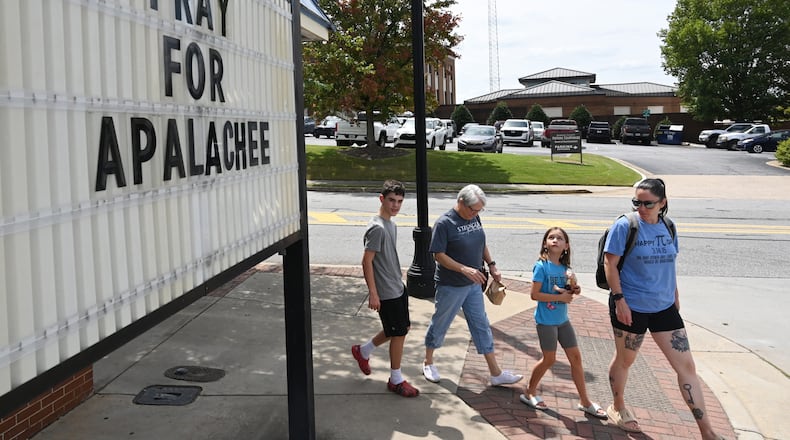For more than a decade, gun control activists have worked in vain to restrict Georgia laws that granted more expansive access to firearms.
On Thursday, the day after two teenage students and two teachers at Apalachee High School were killed and nine others were wounded by morning gunfire at the school, they renewed their calls for changes to state laws that in recent years have only grown more relaxed.
Ever since Republicans took control of the Legislature and the Governor’s Mansion in 2004, most attempts to make it more difficult to access guns have been futile, although the conservative Democrats who previously ran the state weren’t necessarily big on gun control either.
Everytown For Gun Safety — a pro-gun control group — ranks Georgia as having the 46th-least-safe gun laws. Jerry Henry, executive director of the gun rights group GA2A — formerly known as Georgia Carry — said that means Georgia has the fifth-best laws for gun owners in the country.
In Georgia, minors are not allowed to possess handguns, but it is legal for them to carry long guns — such as the AR-15-style gun used in Wednesday’s shooting.
Here’s a look at where Georgia’s gun laws stand today, how they got there and what bills got some traction but didn’t make it across the finish line.
2024: Several bills attempting to address the safe storage of weapons worked their way through the legislative process this year, but none won final passage.
One effort would have granted tax credits to people who purchase firearm safety equipment, such as lockboxes or trigger locks, and those who underwent gun safety training.
Another would have removed the state sales tax from firearm safety equipment. And a third would have included gun safety equipment in a sales tax holiday on all firearms and ammunition during the first week of hunting season.
2022: Lawmakers approved a law that allows a “lawful weapons carrier” to carry a concealed handgun everywhere license holders currently are allowed — meaning guns would still be prohibited in places such as the secured areas of airports or government buildings that have security at the entrance, including the state Capitol.
The bill also enacts the “reciprocity” measure from the previous year.
2021: A bill that would have allowed anyone to bring their firearm into Georgia if he or she has a carry permit in their state, known as “reciprocity,” stalled in the final moments of the 2021 session. If the bill had passed, the final vote would have occurred just weeks after eight people were gunned down in three Atlanta-area spas.
2018: In the days after the shooting at a South Florida high school that left 17 people dead, the Legislature seemed poised to pass a fast-tracked bill backed by Republicans that aimed to keep guns out of the hands of Georgians with mental illnesses.
It would have lifted a state mandate on the Georgia Bureau of Investigation that requires officials to purge the records from the National Information Crime Center database of people unwillingly committed for mental health treatment after five years. Federal law bans those who were involuntarily committed from possessing guns indefinitely. Under the law, so would have Georgia.
The bill passed the House and a Senate committee, but it did not reach the Senate floor for a vote.
2017: The state enacted a law allowing anyone with a concealed weapons license to carry firearms on all public college and university campuses, with exceptions that include dormitories, fraternity and sorority houses, and buildings used for athletic events.
2015: Considered a “cleanup bill” by gun rights activists, legislators passed a law that bans the carrying of weapons within 150 feet of a polling place only while an election is being conducted. The previous year’s law banned weapons within 150 feet of polling places, but it did not specify an election needed to be occurring at the time.
2014: Lawmakers made carrying a gun legal in several places where guns previously were prohibited when it enacted a law allowing firearms in all bars and government buildings — including courthouses — where there is no security at the entrance.
The law also legalizes the use of silencers for hunting, clears the way for school staffers to carry guns in school zones and lets leaders of religious congregations choose whether to allow people to carry guns inside.
2010: Lawmakers passed a measure allowing licensed gun owners with a carry license to have a gun in bars if owners allow it, in nonsecured areas of airport property and in the parking lots of colleges, courthouses and jails. It also eliminated a 1,000-foot limitation on guns at schools and colleges.
2008: Lawmakers passed a law repealing a prohibition on carrying guns on public transportation, in restaurants that serve alcohol, and in parks, historic sites and wildlife management areas. That law also allows people to have a gun in their car without a carry license unless they have been prohibited from owning one for reasons such as being convicted of a felony.
2006: Georgia lawmakers passed a self-defense law, commonly known as “stand your ground,” that allows people to use deadly force if they have reason to believe their life or property is endangered.
The state also enacted a law that required courts to run gun carry license applicants through the Georgia Crime Information Center and conduct background checks on all initial and renewal applications.
About the Author
Keep Reading
The Latest
Featured



